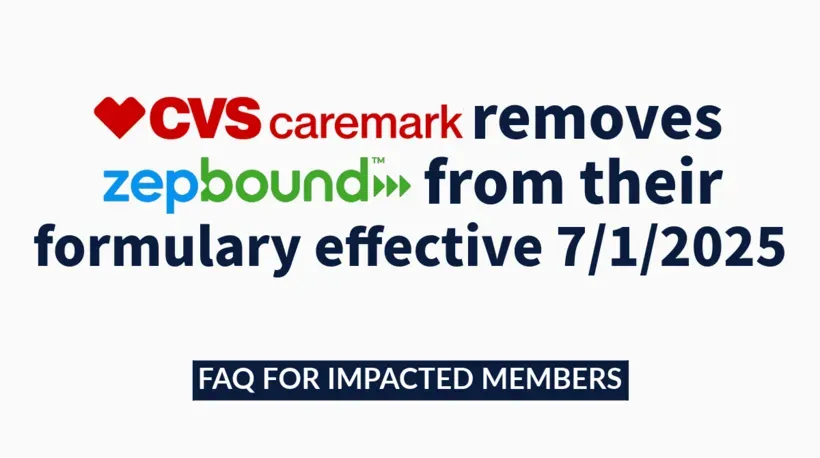CVS Caremark Zepbound removal has stirred significant concern among patients relying on GLP-1 medications, particularly for those who have been using the drug for weight management. Starting July 1, CVS Caremark decided to eliminate Zepbound (tirzepatide) from its preferred drug list, opting instead to promote Wegovy (semaglutide). This change, driven by rising costs according to CVS Caremark, has left many patients feeling frustrated and anxious about their treatment options. With some reporting successful weight loss results from Zepbound, the switch to Wegovy has sparked a heated conversation online and in the medical community. As the pharmacy benefit manager teams up with Novo Nordisk to enhance access to Wegovy, the implications of this decision warrant a closer look at patient choices and continuity of care.
The removal of Zepbound from CVS Caremark’s preferred list signals a substantial shift in the landscape of weight loss and obesity management medications. By replacing tirzepatide with semaglutide, CVS Caremark aims to streamline coverage and potentially address affordability issues faced by patients. However, this change raises critical questions about individual patient needs and the effectiveness of the new treatment options available. As healthcare providers navigate this transition, many are left pondering the implications for those who may find themselves unable to switch medications without experiencing adverse effects. The evolving dynamics between pharmaceutical companies, insurance providers, and patient access are more crucial now than ever.
Impact of CVS Caremark’s Decision on Patient Choices
The removal of Zepbound from CVS Caremark’s preferred drug list has significant implications for patients relying on GLP-1 medications for weight management. With the shift favoring Wegovy, many individuals face the uncomfortable reality of having to switch medications mid-treatment. This forced transition can disrupt continuity of care, as patients may have begun to see positive results on Zepbound, only to be pushed towards Wegovy, which might not be as effective for everyone. Dr. Tro Kalayjian, an expert in obesity medicine, points out that such disruptions in treatment could lead to setbacks in patients’ weight loss journeys and overall health outcomes.
Moreover, patients previously stable on Zepbound are naturally concerned about the switch. For instance, those who have recently experienced significant weight loss or minimal side effects are understandably apprehensive about the effectiveness of a new medication. The disappointment voiced by users on platforms like social media reveals a shared sentiment: that individualized treatment options are essential for successful weight management. As this situation unfolds, it will be crucial for healthcare providers to assess the consequences of such formulary changes on patient health.
Reasons Behind CVS Caremark’s Preference for Wegovy
CVS Caremark’s decision to prioritize Wegovy over Zepbound correlates with a broader trend in the pharmaceutical industry: cost management. By negotiating with Novo Nordisk to make Wegovy more affordable, CVS aims to reduce out-of-pocket expenses for its members, ultimately enhancing access to weight-loss medications. Despite the apparent benefit, this strategy raises questions about the long-term implications for medication pricing and availability. As patients navigate their options, understanding the financial motivations behind these formulary changes becomes vital.
The increased focus on Wegovy indicates a potential shift in market dynamics influenced by drug pricing strategies. CVS Caremark’s statement succinctly highlighted the financial burden placed on consumers by high pharmaceutical prices, though unfortunately, it may limit patient options in practice. While Wegovy’s manufacturing company, Novo Nordisk, collaborates with CVS for better access, one must consider whether such limitations might stifle patient choice, which is crucial for effective treatment. The overall goal should be to ensure patients have access to the most effective therapies that cater to their unique needs.
The Efficacy of Wegovy Compared to Zepbound
The shift from Zepbound to Wegovy underscores the debate surrounding the efficacy of these GLP-1 medications. Clinical studies indicate that Zepbound, with its unique mechanisms, may lead to slightly more effective weight loss compared to Wegovy. For instance, recent research suggests that participants using Zepbound lost an average of 50 pounds, which represents a more significant percentage of body weight versus those on Wegovy. For some patients, the effectiveness of a medication can be a determining factor in their adherence to a weight loss program, amplifying concerns about the forced transition.
However, it’s worth noting that while the differences in weight loss outcomes between the two drugs exist, both Zepbound and Wegovy share a similar side effect profile. The potential for nausea and abdominal discomfort is present in users of both medications, which highlights the importance of personalized medicine. As advocates for patient care continue to stress, an individualized approach that considers the unique responses of patients to different therapies is essential for optimizing weight management strategies.
Patient Reactions to Forced Drug Switch
The announcement of CVS Caremark’s decision has unleashed a barrage of reactions from patients, particularly those who felt their progress with Zepbound was promising. Many patients took to social media to express their frustrations and fears about the transition to Wegovy. Comments reflecting concern for effectiveness, safety, and side effects are prominent among discussions, depicting a community now faced with uncertainty about their treatment. Such sentiments highlight the necessity for healthcare providers and insurers to prioritize clear communication and patient education amidst policy changes.
Patients experiencing the relief of weight loss are understandably defensive of their treatment regimen, especially when positive results with Zepbound were being achieved. The emotional and psychological aspect of switching medications shouldn’t be overlooked—patients often develop trust and reliance on their current therapy. As these adjustments unfold, ongoing support from healthcare providers will be crucial in helping individuals navigate their options and manage any effects from changing medications, ensuring that their weight loss goals remain on track.
Navigating the Formulary Exception Process
For patients adversely affected by the removal of Zepbound, CVS Caremark has introduced a formulary exception process, allowing individuals to request continued coverage of Zepbound under specific circumstances. Patients need to be aware of the criteria for a successful exception request—those who have experienced severe side effects or lacked sufficient weight loss with Wegovy can initiate this process. Such a safety net provides some peace of mind for patients anxious about being forced onto a less effective therapy.
This formulary exception process emphasizes the importance of maintaining open lines of communication between patients and their healthcare providers. For those wishing to appeal their medication status, collaboration with physicians is vital to portray the necessity of the original treatment. Providers should be prepared to advocate for their patients, gathering necessary documentation and evidence to support these requests. Ultimately, the aim should be to prioritize patient well-being and ensure access to effective therapies essential for weight management.
Understanding GLP-1 Weight Loss Drugs
GLP-1 medications like Zepbound and Wegovy are at the forefront of obesity treatments, functioning by imitating the glucagon-like peptide-1 hormone, which regulates appetite and blood sugar levels. This class of drugs has been groundbreaking for individuals struggling with weight, offering a more effective solution for chronic weight management compared to traditional methods. As more patients seek effective medications for obesity, understanding the function and benefits of these treatments is crucial for informed decision-making.
Furthermore, while both Zepbound and Wegovy have proven to be effective options, patients should remain vigilant about their side effects and interactions. Continuous dialogue with healthcare providers about their experiences and any adverse reactions is essential for effective management of their treatment regimen. As the popularity of GLP-1 medications continues to grow, further research can be expected to optimize these treatments, paving the way for innovations that might cater to patient needs more effectively.
The Role of Pharmacy Benefit Managers
Pharmacy Benefit Managers (PBMs) like CVS Caremark play a pivotal role in the drug supply ecosystem, influencing which medications are accessible to patients through pricing strategies and formulary decisions. The recent removal of Zepbound from CVS Caremark’s preferred list illuminates the significant power PBMs hold over patient choices and access to therapies. While their role includes the intent to lower costs for consumers, the trade-off appears to be a reduction in medication options that cater to diverse patient needs.
As patients navigate insurance coverage challenges, they must understand the implications of PBMs’ decisions on their treatment paths. The dynamics between PBMs, pharmaceutical companies, and healthcare providers must be examined critically to ensure that patient interests remain at the forefront of decision-making processes. Engaging in informed conversations about medications and coverage can empower patients to take an active role in their health management journey.
Future of Weight Loss Medications
The evolving landscape of weight-loss medications reflects both hope and uncertainty for patients. As CVS Caremark’s recent changes demonstrate, the dynamics between insurance coverage and medication efficacy are complex, impacting real lives. Drug manufacturers are incentivized to innovate, with the demand for effective weight-loss solutions growing steadily. As patients seek effective therapies, it is vital that future medications address both efficacy and safety concerns to ensure that individuals have access to the best possible treatment options.
In the future, it will also be essential for healthcare systems to adapt in response to the growing need for effective weight management solutions. Increased collaboration between manufacturers, PBMs, and healthcare providers could unlock pathways for better affordability and access to critical drugs. As more individuals turn to medications like Wegovy and Zepbound for weight management, sustained focus on medication effectiveness, patient safety, and accessibility will be required to improve outcomes in obesity treatment.
Advocating for Patient Rights in Medication Access
As changes in drug formularies threaten patient access to effective medications, advocacy for patient rights becomes paramount. Patients affected by CVS Caremark’s decision to remove Zepbound need to be aware of their rights to request alternative treatments under certain circumstances. It’s crucial for patients to voice their concerns, whether through social media, direct communication with their providers, or participation in advocacy groups. Empowered patients can drive attention to the needs for better access to essential therapies.
Additionally, raising awareness about the implications of pharmacy benefit managers and their formulary actions can contribute to more informed discussions on healthcare policy. Through collective advocacy efforts, patients can work to ensure that decisions made by PBMs prioritize their health outcomes rather than solely focusing on cost-saving measures. In a rapidly changing healthcare landscape, patient advocacy will play a critical role in shaping the future of medication access and determining which therapies are available to those who need them.
Frequently Asked Questions
What does CVS Caremark Zepbound removal mean for patients using Wegovy?
CVS Caremark’s removal of Zepbound from its preferred drug list means that many patients who are currently using Zepbound for weight loss may have to switch to Wegovy. This change, effective July 1, 2025, is part of CVS Caremark’s efforts to reduce costs and increase access to medications, but it may disrupt continuity of care for those who were benefitting from Zepbound.
Why did CVS Caremark decide to remove Zepbound in favor of Wegovy?
CVS Caremark removed Zepbound from its formulary due to rising drug costs. The company stated that by preferring Wegovy over Zepbound, they aim to lower out-of-pocket prices and improve access for patients to effective weight management therapies, even though this decision limits patient choices.
Are patients able to get exceptions for Zepbound after its removal by CVS Caremark?
Yes, patients who have previously experienced severe side effects from Wegovy or did not achieve sufficient weight loss can request a formulary exception through CVS Caremark. This allows for a case-by-case review for coverage of Zepbound based on medical necessity.
How do Zepbound and Wegovy compare in terms of weight loss effectiveness?
Zepbound is reported to be slightly more effective than Wegovy for weight loss due to its additional mechanism of action. However, both medications yield similar weight loss results, with studies showing participants on Zepbound losing approximately 50 pounds compared to about 16 pounds for those on Wegovy.
What should patients do if they prefer Zepbound but CVS Caremark has removed it?
Patients who prefer Zepbound but find it removed from CVS Caremark’s preferred list can consult with their healthcare provider about requesting a formulary exception. They may also consider directly purchasing Zepbound from Eli Lilly, though it can be expensive, ranging from $300 to $500 per month.
What are the side effects of Zepbound compared to Wegovy?
The reported side effects for Zepbound and Wegovy are quite similar, with common issues being nausea and abdominal pain. Approximately 44% of users of both medications experience nausea, while 25% report abdominal discomfort.
What options are available for patients affected by CVS Caremark’s decision on Zepbound?
Patients affected by the removal of Zepbound can discuss options with their healthcare provider, including potential exceptions for continued coverage of Zepbound or switching to Wegovy. They can also explore other weight loss medications based on individual health needs.
| Key Points | Details |
|---|---|
| CVS Caremark removes Zepbound | Zepbound (tirzepatide) has been removed from CVS Caremark’s preferred drug list and replaced with Wegovy (semaglutide) due to rising drug costs. |
| Patient Impact | Patients are unhappy about the forced switch, as they experienced significant weight loss and minimal side effects on Zepbound. |
| Reason for Change | CVS Caremark cites costs imposed by drug manufacturers as the reason for the change in their formulary. |
| Availability of Alternatives | Patients can request a formulary exception for coverage of Zepbound if they have had bad experiences with Wegovy. |
| Drug Manufacturer Information | Zepbound is manufactured by Eli Lilly, while Wegovy is produced by Novo Nordisk. |
Summary
CVS Caremark Zepbound removal has forced patients to seek alternatives for their weight loss treatment. As of July 1, 2025, this change has frustrated many patients who were successfully using Zepbound and impacts their ongoing treatment plans. CVS Caremark’s decision to remove Zepbound from its preferred drug list, citing rising drug costs, necessitates that individuals on this medication must either switch to Wegovy or request exceptions for coverage. This development underscores the impact of insurance formulary changes on patient care, emphasizing the need for comprehensive solutions to ensure that patients retain access to effective weight management medications.



